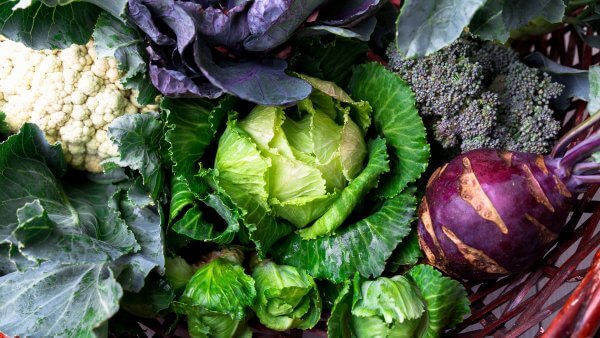Is Green Good or Bad when it Comes to Hypothyroidism?
Green is the new black – when it comes to food.
Green smoothies have been trending for several years now in the kitchens of clean eaters and in hipster and health cafes. With ingredients like kale, celery, mint, cucumber, spinach leaves and avocado, they offer a super-nutrient hit.
But are cruciferous vegetables like kale and collard greens a good choice for women who are seeking hormone balancing diets? And most importantly, are they the right choice for your body?
Or, could that morning smoothie or plate of bok choy with broccoli be upsetting your thyroid function and causing symptoms of hormone imbalance? And could it be upsetting your thyroid gland?
Your thyroid is a butterfly-shaped gland located in your neck below your Adam’s apple. It works like the gas pedal for your metabolism and also regulates your weight, energy, gastrointestinal health, nervous system, and hormone balance. It produces two important hormones:
T4 and T3
Goitrogenic Foods and Cruciferous Vegetables
Women who are balancing hormones through diet often eat these. They include:
- Arugula (rocket)
- Bok choy
- Broccoli and broccoli sprouts
- Brussels sprouts
- Cabbage
- Cauliflower
- Collard greens
- Kale
- Kohlrabi
- Radishes
- Mustard greens
- Soy
Does kale lower thyroid hormones?
There are very few human studies that measures how the thyroid is affected by crucifers.
Of the available evidence, there is very little to suggest that foods like broccoli upset natural hormone balance and thyroid health.
One study done at University of California, researchers concluded that though collard greens, Brussels sprouts, and some Russian kale (Brassica napus) contain enough goitrogenic compounds to potentially decrease iodine uptake, that’s not true for all cruciferous vegetables.
The researchers found that turnip tops, broccoli, broccoli rabe, and kale contain less than 10 μmol of goitrogenic chemicals per serving of 100g, concluding that those foods can be considered minimal risk.
In another small study, participants were given 150g of Brussel’s sprouts daily for 4 weeks. Even though these sprouts contained a super high 220 mg per 100 g. of sulfurous chemicals called glucosinolates, they did not affect thyroid function.
Measurement of thyrotrophic hormone, thyroxine and tri-iodothyronine in the study subjects was unchanged. The researchers believe this was because the Brussels sprouts were cooked and produced myrosinase, an enzyme that helps to deactivate the glucosinolate levels.
Bottom line?
There is no evidence that cruciferous vegetables slow down or “kill the thyroid.” Unfortunately, there are many health bloggers who don’t fact-check and have cut and re-pasted incorrect statements claiming that “all leafy greens are bad for your thyroid,” when that’s not the case.
In fact, cruciferous vegetables are super nutritionally dense foods so they are good for women with thyroid issues who are often depleted in micronutrients.
Why Leafy Greens Are Great for Your Thyroid
While it’s possible that large amounts of raw cruciferous foods can somewhat inhibit the thyroid gland’s ability to take up iodine to produce the T4 hormone, there’s a bigger picture.
If you have a condition such as Hashimoto’s, the primary focus should be restoring your digestive tract and detoxifying the body – as they are usually the original triggers for thyroid conditions. Avoiding cruciferous vegetables does not completely help improve those health issues.
Leafy greens are richer in vitamins and minerals than any other of their distant veggie cousins. As most Americans are undernourished, cutting out these foods then makes us rely further on supplements – which is not the way we should be living and healing.
Since 90% of thyroid problems occur for autoimmune reasons, I believe it’s more important to restore the health of your immune system through your gut, than obsess about cutting out all crucifers.
I have found that for most women who experience hormone imbalance symptoms, the benefits of cruciferous vegetables outweigh the very small risks.
The color and sharp, often bitter flavor of cruciferous veggies confer an impressive range of health benefits that largely come from their levels of glucosinolates, which are powerful plant chemical compounds which come in around 120 different varieties.
Facts About Cruciferous Vegetables
1. They are potent anti-inflammatory agents
When you chew and digest your leafy greens, glucosinolates break down into biologically active nutrients called isothiocyanate, which have anti-inflammatory actions. The two most powerful varieties are called sulforaphane and DIM- (diendolmethane).
These protect you against disease. They help switch on antioxidant genes and enzymes in specific immune cells and may neutralize cancerous cells so that they don’t grow and multiply.
2. They support liver function and thyroid hormone conversion
Studies also show that these glucosinolates support your liver function by activating phase 2 detoxification. A well functioning liver is critical in helping the conversion of T4 to T3 and that is particularly important for thyroid patients. That conversion in part happens in the liver via a process called deiodination.
3. They help combat estrogen dominance (the leading cause of thyroid nodules and thyroid cancer!)
Most pre-menopausal women I work with have some level of estrogen dominance, which is barely surprising, given the estrogenic cocktail of skincare products, cleaners, packaging and food we are exposed to in our modern world. Leafy greens can reduce the load.
Goitrogenic vegetables are rich in a substance called DIM (diindolylmethane) which is key in liver detoxification as well as the elimination of mutated estrogen metabolites. This, in turn, helps women maintain a healthy balance of estrogen, progesterone and thyroid hormone, which is critical if you want to naturally balance hormones.
As a result, you can better filter estrogen metabolites from your bod.
In this study, after indole-3-carbinols from crucifers were given to people in supplement form, urine samples were taken. The results showed that increased concentrations of estrogen metabolites were filtered from the body, including greater removal of estradiol, estrone, estriol and 16-alpha-hydroxytestrone.
As these estrogen byproducts can be harmful if they keep circulating at high levels, women who eat their leafy greens may reduce Estrogen Dominance.
Stabilizing estrogen can also help stabilize many other hormones.
4. Have protective benefits against cancer
Leafy greens not only help prevent cancer and block the new blood vessels that cancerous tumors set up to feed on, they can also help to improve odds of survival for women with breast cancer.
5. Benefit good bacteria
The rich soluble dietary fibers in crucifers include hemicellulose and pectin. These have been shown in studies to help stabilize blood glucose levels and lower cholesterol. Most importantly, they provide food for different kinds of healthy bacteria.
These bacteria can help to increase your levels of serotonin (which helps boosts your mood) and melatonin (helps aid in sleep) and lower your levels of insulin (protects against weight gain and Diabetes Type 2).
Resistant starch can also boost your levels of good bacteria. Learn more about resistant starch foods and how they benefit thyroid health here.
De-Activating Goitrogens
There are two effective ways to reduce the goitrogenic content of foods like broccoli, kale, silverbeet, and cauliflower..
1. Cook Your Crucifers
Cruciferous foods are goitrogenic when raw. But once cooked, the glucosinolates they contain are deactivated, losing up to 80% of their goitrogenic chemicals, so that they no longer block the uptake of iodine.
Research from the University of Illinois shows that when lightly cooked but still al dente (after being steamed for three to four minutes), the short exposure to heat warms up broccoli enough to destroy a protein it contains that holds on to sulfur.
At the same time, lightly cooking broccoli activates (but does not destroy) the myrosinase enzyme that helps release the broccoli sulfurs. This ensures the sulfurs are more bio-available to be absorbed when eaten, while the goitrogenic effects are lessened.
Boiling can also be very effective because it allows the glucosinolates to leach into the water.
2. Ferment Your Crucifers
Fermented vegetables are powerful hormone balancing foods because they contain good bacteria to boost your gut health. And, though fermented crucifers like sauerkraut are raw, you don’t need to cut them out.
It’s okay to have one or two small tablespoon servings of fermented foods like broccoli, cabbage, kale or cauliflower a day.
Mix up your ferments so they are not all filled with cruciferous vegetables and don’t forget about fermented foods like miso, dill pickles, coconut water kefir and coconut yogurt.
You can also consider cooking crucifers then mixing them in with raw vegetables like carrot and beetroot, for fermentation.
What About Green Smoothies?
Some experts who specialize in female hormone imbalance believe that women with thyroid problems can eat goitrogenic foods with no problem.
Others believe that cruciferous vegetables like kale, compromise or worsen thyroid function. They recommend that women with Hashimoto’s, Graves’ disease or suspected thyroid problems, avoid eating crucifers altogether.
Let me share with you that in my experience, having worked over the years with so many Hashimoto’s patients, I have not seen anyone heal by just avoiding cruciferous vegetables.
Recommendations
Eat cooked cruciferous vegetables in abundance as they pose little risk to women with thyroid conditions and help your liver and gut, which are the key organs you need to support.
Reduce intake of raw crucifers if you have a low thyroid function (don’t toss raw kale in your green smoothie every day).
If you enjoy raw crucifers and their health benefits, limit your intake to 2 or 3 servings per week.
Minimize oxalates:
These are found in foods like kale and they can deposit themselves in the thyroid gland and cause damage. In turn, the thyroid does not produce enough of the T4 hormone. People suffering from poor gut health are particularly susceptible. Oxalates also bind to minerals like calcium, so they’re not easily absorbed.
Eat iodine rich foods:
If you don’t have an overactive thyroid but you are worried leafy greens could reduce your intake of iodine, eating foods rich in iodine may help counter possible impacts of the goitrogens.
Good choices include seaweed, yogurt and eggs (if they are not reactive for you), fish and shellfish, prunes and of course, Celtic or Himalayan pink salt, which is rich in iodine and minerals.
Minimize or avoid intake of soy and GMO:
Soy (milk, tofu, tempeh, soybean oil) is not only goitrogenic, it also contains phytates, which can bind up your minerals like zinc and magnesium, so you don’t absorb them. For this reason I suggest that you shift from soy to coconut milk. If you’d like to try making your own coconut milk.
A Word Of Caution
Having said that crucifers should not be banned from a hormone balancing diet, I want to add a few qualifying comments:
- If you have hypothyroidism due to a deficiency in iodine, goitrogenic foods could lower your iodine further. So eat them with caution.
- If you suspect you might have thyroid issues, you may still be making some of your own thyroid hormones in low amounts and goitrogenic foods could deplete that production further.
- I know many women with thyroid problems who have had great health results when they limit their intake of foods high in goitrogens.
- I have also met many newly converted vegans and vegetarians who developed thyroid symptoms months after replacing meat protein with lots of soy foods, and goitrogenic foods like kale.
The Bottom Line
The key to treating thyroid conditions (since most of them are autoimmune conditions triggered by troubled digestive health), is to restore your digestive health.
Estrogen dominance is the leading cause of thyroid nodules and thyroid cancer – the fastest growing cancer in the United States. Cruciferous vegetables help with estrogen detoxification and prevent the development of nodules and cancers.



